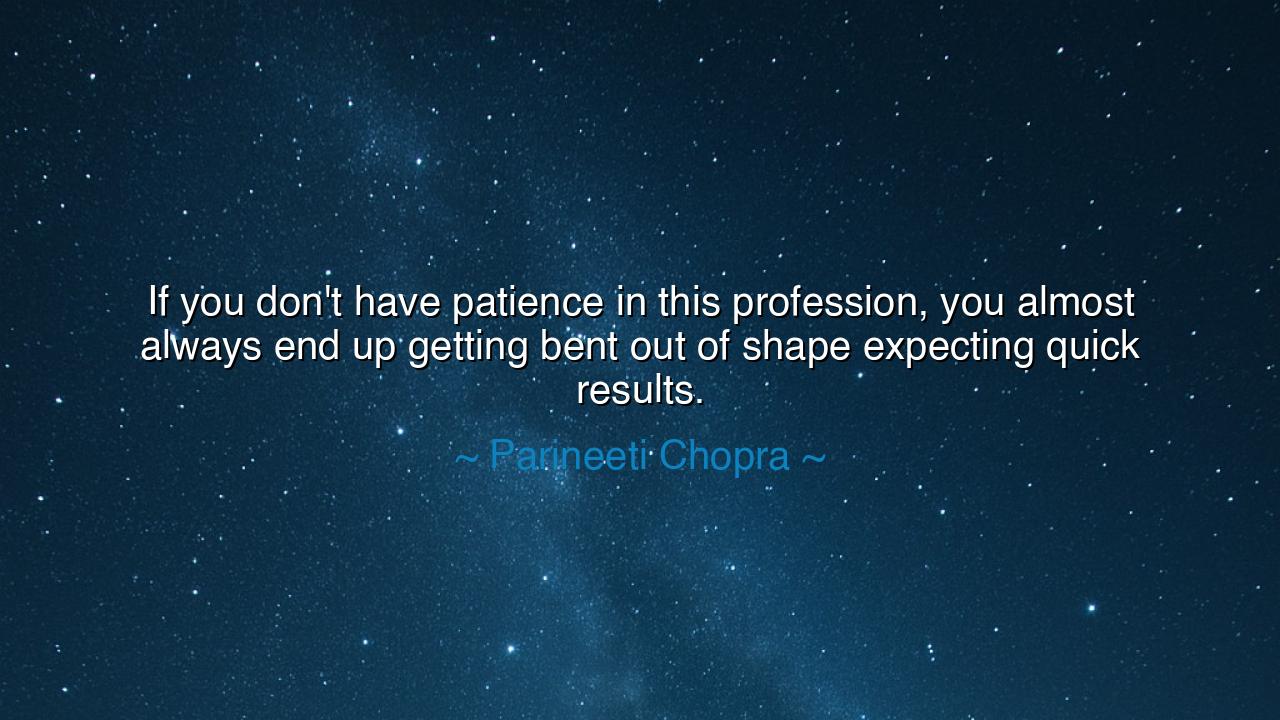
If you don't have patience in this profession, you almost always
If you don't have patience in this profession, you almost always end up getting bent out of shape expecting quick results.






Hear the words of Parineeti Chopra, spoken with the candor of experience: “If you don’t have patience in this profession, you almost always end up getting bent out of shape expecting quick results.” Though she speaks of her own field of artistry, her insight resounds across every path of life. For she names a law as old as the earth itself—that greatness is not born in haste, but in endurance, and that those who demand swift fruits often find themselves disheartened and broken.
When Chopra warns of lacking patience, she speaks of a fire that consumes countless souls. Many enter a craft with dreams blazing in their eyes, eager for fame, recognition, or mastery. Yet when their labor does not yield quick results, they grow restless, angry, or despairing. Such impatience is like digging up seeds each day to see if they have sprouted; in the end, nothing grows, for the very process has been disrupted. True profession, whether in art, science, or toil, demands the discipline to wait upon time, and the humility to honor the long journey.
Her words remind us of the ancient tale of the sculptor who carved marble. With each strike of the hammer, progress was invisible, and many mocked him, saying, “Why strike a stone that never changes?” Yet he continued with patience, until one day the figure of a god emerged, wondrous and radiant. Those who sought quick results would have abandoned the task after the first blows, but the patient hand created immortality. So it is in every profession: mastery is hidden in the accumulation of countless unseen efforts.
Consider the life of Thomas Edison, who sought to create the electric light. He tried and failed thousands of times, each attempt seeming like folly. Had he sought only quick results, he would have abandoned the dream and vanished from history. Yet his patience turned failure into a ladder, and at last, he lit the world. Chopra’s saying is thus proven: the impatient grow weary and collapse, but the patient endure until their vision is realized.
And so, the origin of her words lies in the crucible of performance, where artists often wait years before their craft is recognized. Yet this is not the burden of actors alone. The farmer who sows must wait for seasons. The warrior who trains must wait for battle. The student who studies must wait for wisdom. Life itself is a teacher of patience, and those who ignore this lesson suffer bitterness.
The lesson, then, is eternal: do not measure your worth by the speed of your results. For the road to greatness is long, winding, and filled with delays that test the spirit. If you are shaken by every obstacle, you will never endure to the end. But if you walk with patience, each step becomes part of your triumph, and when the day of fruit arrives, it will taste sweeter for the waiting.
Practical action lies in this: set your goals, but surrender your timeline to the wisdom of life. Work diligently each day, but do not grow bitter if the harvest is not immediate. Guard your spirit against envy of those who seem to advance faster, for each journey is different, and haste often hides fragility. Cultivate the strength to persist without seeing, to endure without reward, to trust that time will reveal the value of your labor.
Thus, Parineeti Chopra’s words stand as a reminder to all generations: patience is not simply a virtue; it is the lifeblood of every profession. To seek quick results is to stumble into ruin, but to endure with calm faith is to rise unshaken. Let all who labor take courage: the reward comes not to the swift, but to the steadfast. Be patient, and you will not be bent out of shape—you will be shaped into greatness.






AAdministratorAdministrator
Welcome, honored guests. Please leave a comment, we will respond soon